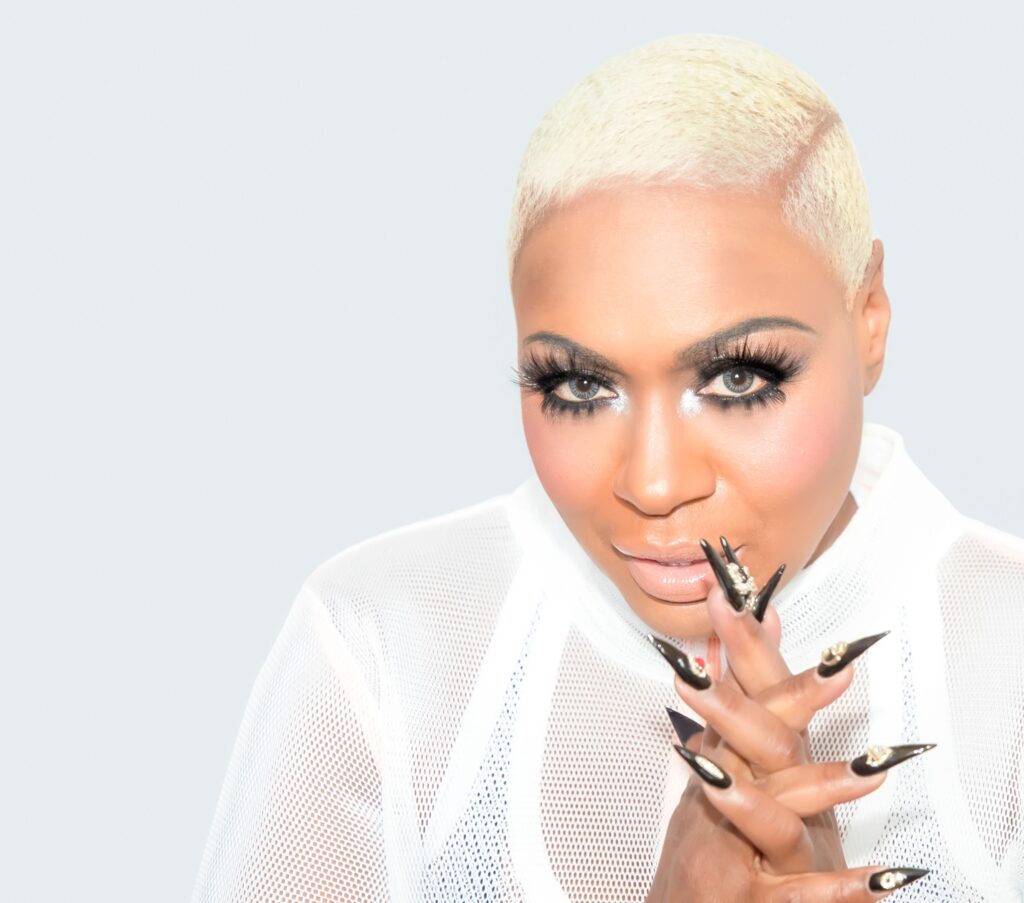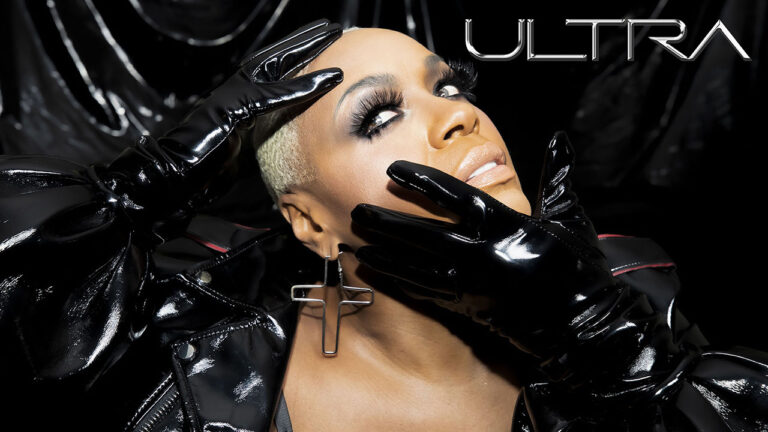Any DJ with a love for soulful house music will know Ultra Naté as a genre legend. Scoring with evergreen hits like “Free,” “Found a Cure,” “Automatic,” and “Unconditional,” she has one of dance music’s most stirring and recognizable voices.
But for the past two decades, she’s also been a very busy DJ. Running the Deep Sugar events in her native Baltimore and beyond, she’s kept the party soulful and maintained her support for all things underground.
In late 2022, she released her eighth album, ULTRA, which includes recent singles “RICH M’FKs,” an electro-jam collab with Henrik Schwarz, and “Survivor,” a life-affirming collab with Tracy Young. So, we connected with Ultra Naté to discuss her latest music, her DJing, her Deep Sugar parties, and her ongoing contributions to dance music.
DJ LIFE MAG: Your most recent album, ULTRA has got a mixture of strong material there – house, pop, funky jams, plus some electro & Afro-house vibes – and some really cool collabs. Creatively, how did you approach the ULTRA album?
Ultra Naté: Thank you! I was already putting the framework of an album together for a year or more before the pandemic hit. It was a different feel, and I was working on it very loosely in between my touring schedule. Once the pandemic lockdown happened, it inspired a different kind of energy and afforded me the time to focus and concentrate on working consistently on crafting this new piece. The timing is all based on what has happened over the last two years in our lives and how, as creatives, we have been able to not only help ourselves, but also help others. Our ability to create has been a lifeline for us and needed by the people out there suffering through so much hardship and trauma.
DJ LIFE MAG: “RICH M’FKs” has quite a fun electro vibe to it. There’s always a great tension on tunes with a soulful voice over a taut beat and groove – like “I Feel Love.” How did that tune come about?
Ultra Naté: Henrik Schwarz and I had been fans of each other for quite a while. We have never met on the road and we have never worked together, but the lockdown gave us a great opportunity to meet online and bring our creative energies together. I was very excited to connect with him! He was so easygoing and so open and sent me the backing track to two different concepts. “RICH M’FKs” was the first one and I loved that exact tension you speak of. It inspired me to talk about the angst that I was feeling watching so much racism, economic disparity, social injustice, and hate going on every day, as we were stuck in a loop of news media and fear.
DJ LIFE MAG: What was your process in the other collabs? How did you work with the producers and get the results you wanted?
Ultra Naté: The great thing about having a long history and body of work is that you come to the table not having to prove yourself. Everyone steps up, respects each other’s art and are also secure in the knowledge of what the other person is going to bring to the equation. That negates a lot of drama, and you can connect and get on with the business of making music. That’s pretty much what the entire process was like, connecting with collaborators and everyone picking up the ball and running, coming with their A-game, and ready to hit a home run. No guarantees of what the outcome was going to be or where anything was going to go from that moment, but just the basic need and desire to create and collaborate was the primary directive.
DJ LIFE MAG: How did you get through the lockdown?
Ultra Naté: By throwing myself headfirst into making the ULTRA album and putting myself on a schedule every day to create. I also enrolled in university for the year and immersed myself in academia. Both disciplines fed my soul, gave me direction and purpose, while I navigated a lot of loss and instability. I was losing friends to COVID around the world consistently for a year and a half. I was in a very turbulent relationship with a guy I was really into, but we had some real foundation problems that we could not seem to grow beyond, and my livelihood was brought to a screeching halt. So, there were a lot of balls in the air I was trying to juggle, a lot of things pulling me in a lot of different directions. I felt raw emotionally, just rung out! The creative process was definitely the lifeline I needed to feel in control of something and to stay in touch with my inner being.
DJ LIFE MAG: Were you streaming during lockdown?
Ultra Naté: I did stream, although I didn’t jump into that until probably three months into the pandemic. I kind of watched what others were doing and got a feel for what I wanted the production value around my stream to be. Because we were in isolation, I had to execute a lot of things on my own and pretty much wore 12 hats in producing the shows that I did do. I built a streaming studio in my house, I studied how to light it with a green screen, I worked a lot with my graphics and sound guys remotely. I needed to learn what programs to use to execute the stream, what my computer needed to be doing, what my lighting needed to be doing. Somewhere in that I also had to be the artist and think about what I looked like, what I sounded like, whether I was singing or DJing. It was a lot! I pulled it off and they came out great, but I don’t want to work that hard. It was stressful!
DJ LIFE MAG: Do you have a home studio? How do you get your song ideas down?
Ultra Naté: Yes, I do have a home studio. The more independent I have become over the years, the more the necessity to have a setup in house. I still try to keep things simple and straightforward and leave the heavy lifting to proper studio setups outside of my home. However, with the pandemic, all bets were off, and my home set-up became Ground Zero for creativity. I generally work with basic GarageBand to get my ideas down.

Ultra Naté: I live by my Neumann U87 microphone. It’s a beast. I love the clarity and precision, the warmth and sensitivity of the microphone. It really sits the vocals right in your lap.
DJ LIFE MAG: Can you give us a few producer/remixers do you most admire?
Naté: I’ve been a fan of producers like Linda Perry, Pharrell, Louie Vega, Stargate, David Morales, Mark Ronson, and Trevor Horn. They are genre-defining and have created amazing pieces that will sound flawless until the end of time.
DJ LIFE MAG: Obviously, everyone best knows you for your voice, but when did you begin DJing? What pushed you in that direction?
Ultra Naté: I started spinning 20 years ago. It happened organically as a result of the Baltimore underground dance-music scene evolving in a way that I found to be detrimental to its survival. Venues were shrinking and disappearing, youth culture was not embracing or being embraced by the scene, and the music was becoming disjointed. Instead of complaining about it, myself and my bestie DJ Lisa Moody just started playing the records we wanted to hear. We gathered our vinyl, connected with another girlfriend that had two Pioneer Technics 1200s in her house, and just started playing. The bug bit us at that point and we developed a party to help feed the scene shortly thereafter.
DJ LIFE MAG: And that’s Deep Sugar…
Ultra Naté: The party continued to grow and become its own thing. Deep Sugar became our homebase and my training ground. It was important to build our own house and invite everyone in. Inadvertently, it was the perfect way to grow my skills, especially growing up in club culture. I already knew what the expectation was from myself as an established recording artist.
DJ LIFE MAG: In the DJ booth, what gear do you use?
Ultra Naté: I grew up in the culture of analog sound systems. I learned how to play using vinyl on turntables, and the mixer was always a UREI or Rane knob mixer. That is where I’m most comfortable, but it’s considered “old school” now. It took a while for me to get used to sliders and for me to make the transition to CDs and then eventually to drives. I’m totally good with the way things are, though; you must adapt and move with technology, while preserving the culture. So, I have a certain advantage in my mind.
DJ LIFE MAG: And when you can’t get an analog mixer?
Ultra Naté: I prefer to use a Pioneer DJ DJM-V10, but I will certainly make it work with a DJM-900, if need be. The V10 has all the bells and whistles with built in 3-way iso, compression and send/return features for options to create vibes. I also like a nice sub in the booth, in addition to my monitors. I like to feel the bottom end. It’s really about the vibe you create and having the equipment you like puts you more in a comfort zone immediately. However, as time goes on, conditioning makes it easier for you to be effective no matter what – as long as it’s not an absolute trash situation!
DJ LIFE MAG: When you spin, what’s your breakdown on material? How much of it is your tunes?
Ultra Naté: I don’t play my own stuff heavy in my sets. It’s just not a habit I ever really picked up. I like for it to feel special when I do, not expected every time I play. I like to mix up the vibes within a four-to-the-floor energy. I play Afro, gospel house, disco, soulful house, beats, DJ tools and some left-of-center-leaning things. Whatever appeals to me for the dancefloor, I’m in front of.
DJ LIFE MAG: What are a few tracks that are always in your DJ box?
Ultra Naté: Lil Louis feat. ChinahBlack’s “Fable” (Frankie Knuckles’ Directors Cut Classic Club Mix)… just because I love it! DJ Spen’s “Love Is Respect,” because no one can resist disco mashed up with Baltimore’s bang-shang-a-lang. And Toto’s “Africa,” which is a great end-a-night tune for the dancers with the lights up.
DJ LIFE MAG: Which DJs do you admire?
Ultra Naté: That list is way too long over the course of 30 years! It’s simpler to say I enjoy DJs that connect with the crowd and take them on a journey, not just play the Traxsource or Beatport Top 40 tracks of the moment.
DJ LIFE MAG: In your mind, what makes a great DJ? What moves you?
Ultra Naté: I’m a soul kid at heart. My faves are DJs who can make me sing on the dancefloor. I want all the emotion and beats. I’ve always loved to get lost in dancing. That can be inspired by many different kinds of moments, but soul is going to hit me the deepest.
DJ LIFE MAG: Musically, what were your first influences?
Ultra Naté: Like most inner-city kids in America, I grew up on soul classics from artists like Rufus and Chaka Khan, The O’Jays, LaBelle, Stevie Wonder, and Sunday-morning church service. As I got older and tuned into the radio, there was Michael Jackson, Madonna, Tina Turner, Pat Benatar and The Police. I don’t think I ever actively decided to go into music – the music came to me. I was going into medicine after high school, but I discovered club culture. In that environment, I met the Basement Boys, who became my producers when we started hanging out and working on songs.
DJ LIFE MAG: That certainly worked out…
Ultra Naté: For me, it was fun and experimental. I did not see it as a path to suddenly become a thing, but I wrote and recorded a song called “It’s Over Now” with them as my first demo. Once they gave it to Tony Humphries in Jersey, it became an underground classic before it was even released. Shortly after, I ended up on Warner Records in the U.K., suddenly recording albums. At some point along the way, I realized, you are considered a professional recording artist and songwriter! My mind was boggled for quite a while in those early days – what had just happened? From such an authentic and innocent moment, a whole new world and path in life had unfolded.
DJ LIFE MAG: Baltimore has always had a great club-music scene and it’s been appreciated around the world. Why do you think so much talent has come from there and why, over the years, have locals loved and supported this music so much?
Ultra Naté: I think the evolution of house music coming along in the mid to late ’80s, as a derivative of R&B, gospel and disco, gave would-be young, under-financed producers the opportunity to make art and be creative with no judgment and no repercussions. The music that was being created had energy. It was new and it appealed to the new generation that was coming up in the clubs in that era. It felt like a community. It was spiritual, it was freeing and it was church, a home away from home for many people. Everyone was feeling it in all the urban centers where house music was bubbling. Whether you were making the music, playing the music, or dancing to it, you were part of something new and wonderful and it belonged to us.
You only got it if you went to the specific places where it was played, so you were part of a very special secret society. Baltimore has always nurtured that culture. It’s gotten more difficult now that the music business has splintered the scene significantly, but there are still pockets where kids just wanna dance all night. They don’t care about bottles or models or flashiness or pyrotechnics or songs that are played on the radio 50 times a day. They just want to dance, period.
DJ LIFE MAG: So, these days, what can people expect when they attend a Deep Sugar party?
Ultra Naté: Deep Sugar is a continuation of the legacy of our early club community vibes where the dancers are the central focus. The music is true to underground club culture, and we always work to create an immersive dance experience where everyone feels welcome. It’s not pretentious. It’s about love, community, and safe spaces for all. Basically, what built the culture is that very ideology. Dance-music culture has evolved into a completely different animal globally, but there is room for all of it. It’s important, however, for these kinds of spaces to survive… where you can “leave it all on the dance floor.” But, in order for them to survive, those of us from the culture have to do our best to create and support them.
To check out more interviews, click here.


